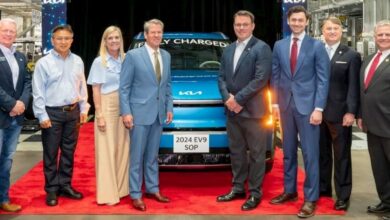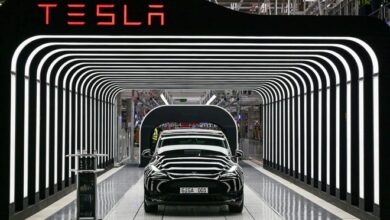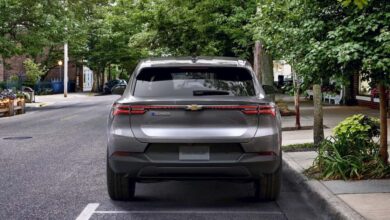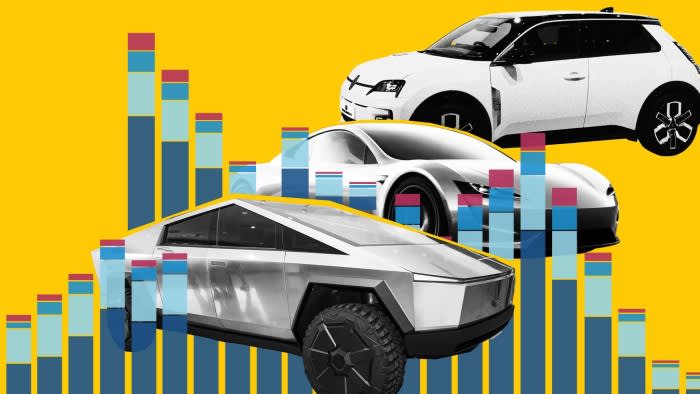Family’s Aussie road trip adventure debunks common EV ‘misconceptions’

An Aussie family is on a mission to change how road trips are done by embarking on an “all electric” camping expedition. The McLennans have vowed to bust the myths around Australia’s so-called flawed EV charging network by proving it’s entirely possible to travel long distances — all without breaking down.
Tim and Renee McLennan, from Bassendean, WA, say there are many “misconceptions” about electric vehicles, which they believe are an important step in finding a solution to the climate crisis. Although Australia is “lagging behind” when it comes to transitioning to EVs, they say an “all electrified” nine-month trip is “completely doable”.
The couple, along with their kids, Ellie and Xavi, have embarked on a 15,000km road trip covering the traditional “big lap” route, starting in Perth and travelling clockwise around the country. Instead of the standard highway route, which has been done by EVs before, “we’re trying to push boundaries a little bit just to see more where we want,” Tim told Yahoo News Australia from the road — with remote and rural areas high on the list of places to visit.
How traveling family have overcome EV ‘range anxiety’
One of the biggest concerns among EV drivers is “range anxiety” — not knowing where or how far away the next charger is. But Tim said it’s not as tough as most might think.
With some planning — mostly using the Plug Share app, a crowd-sourced list of charging options — the couple found the longest distance between charging stations would be 280kms — between Fitzroy Crossing and Halls Creek in WA. They’ve also mapped out most of their stops along the way.
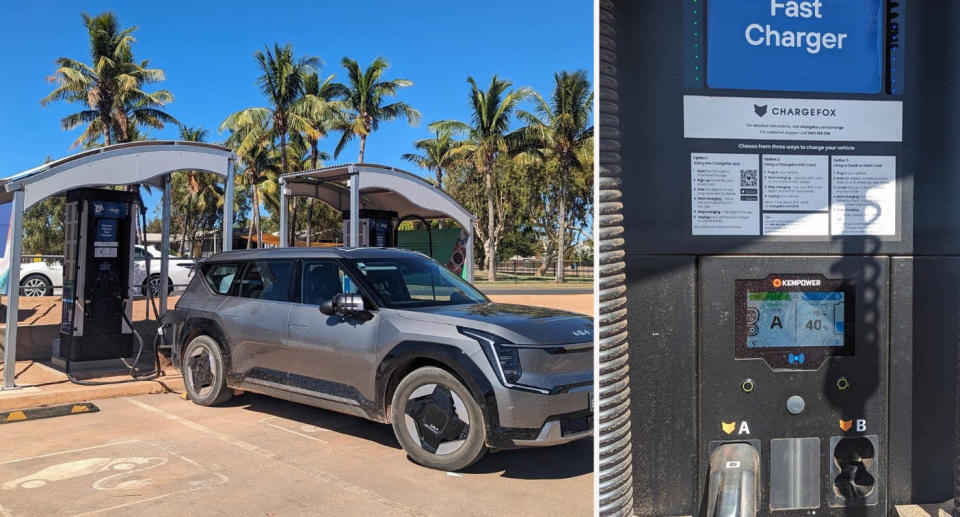

“In the city, our Kia EV9 will get us about 550 kilometres. Once we put a two-tonne caravan, low-profile caravan on the back, we’re seeing roughly, on average, about 280km, but it has varied wildly between 220 and 320km,” he said.
There was one part of their trip — which began mid-March — where they were almost running on empty, causing Renee to sweat a little. But even then there were ample options, Tim explained.
“When we were heading from Karratha to the Nanutarra Roadhouse we ended with two per cent battery and 10 kilometres, according to the estimate of the car. But there’s a multitude of parking bays along the way,” he explained.
“We could have dropped the camper off — then suddenly your range doubles — driven to the nearest town to get a charge and then come back to collect the trailer,” he said. “We’ve also modified the camper to have excess batteries”.
This means Tim and Renee can pull over and plug their vehicle into the camper to “take some battery out of that”. “We’ll then have enough range to get us where we’re going,” he explained.
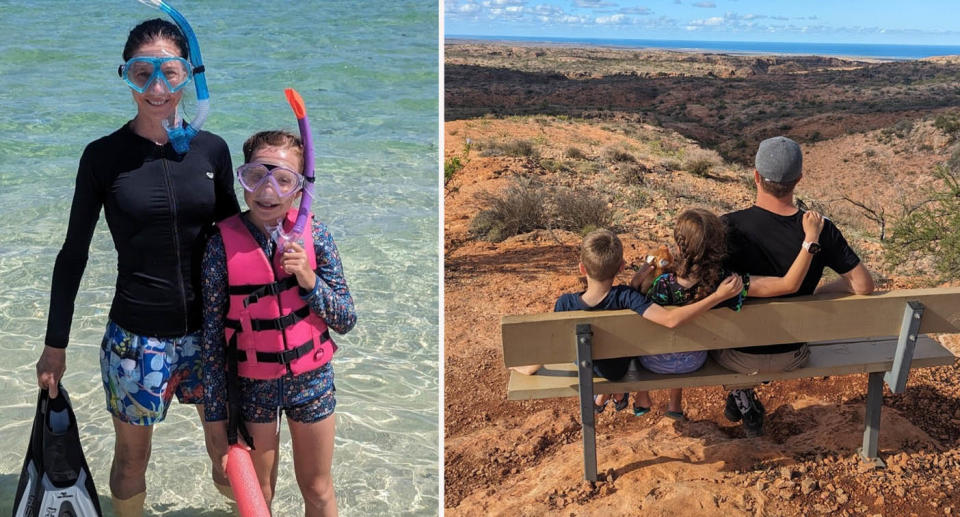

Easy ways to charge EVs while on the road
Fast chargers aside, which are commonly seen roadside or at petrol stations and shopping centres, the couple have relied on ordinary 15amp power points at caravan parks to help charge overnight — a suitable and abundant option he said many people probably don’t think of.
“There are more power points than petrol stations,” Tim said encouraging EV drivers to think outside the box.
Another common issue often raised by EV drivers is the lack of drive-in charging stations. Most are ordinary parking bays at petrol stations and shops meaning they’re often unsuitable to vehicles towing trailers or caravans.
Surprisingly, remote areas are better suited as “many truck stops have charging stations”, Tim explained, for example, the famous Nandour Roadhouse. “The country stations all have the pull-through bays, which is really only where it’s needed,” he said.
So far the couple have travelled “a little over 3,000km” and have spent roughly $300 on charging fees. “We’re still doing all the stuff we wanted to do on the trip. It’s not an overburden driving an EV,” he said
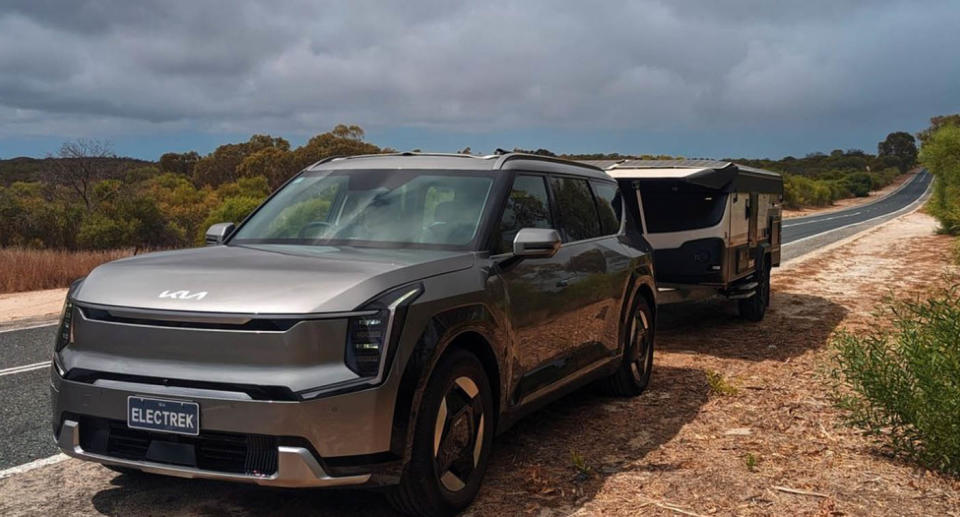

Government’s plan to grow EV network across Australia
In April last year, it was announced the federal government, in partnership with NRMA, would deliver $39.3 million dollars in funding to build 117 fast EV charging sites across the country as part of a plan to grow the country’s EV network drastically by 2030. The aim is to better connect towns and cities and will ensure there is a fast charger approximately every 150km on national highways.
At the time, Minister for Climate Change and Energy Chris Bowen said “EVs aren’t just for the cities” and encouraged longer trips. “We’re making range anxiety a thing of the past,” he said.
“This project will help close the gaps and known black spots in the network and make it possible to drive from Darwin to Perth, Broken Hill to Adelaide, and from Brisbane to Tennant Creek in the NT.”
Tim and Renee have decided to share their EV journey on social media under the name ElecTrekking Australia. They hope it will encourage others to see it’s possible.
“Society can only get better if you’ve got better information to work from,” Tim said. “If we’re doing this to learn, there’s absolutely no benefit from us just hanging on to that information. So we want to let everyone know what was easy, and bust the myths holding society back from improving.”
Love Australia’s weird and wonderful environment? Get our new newsletter showcasing the week’s best stories.

